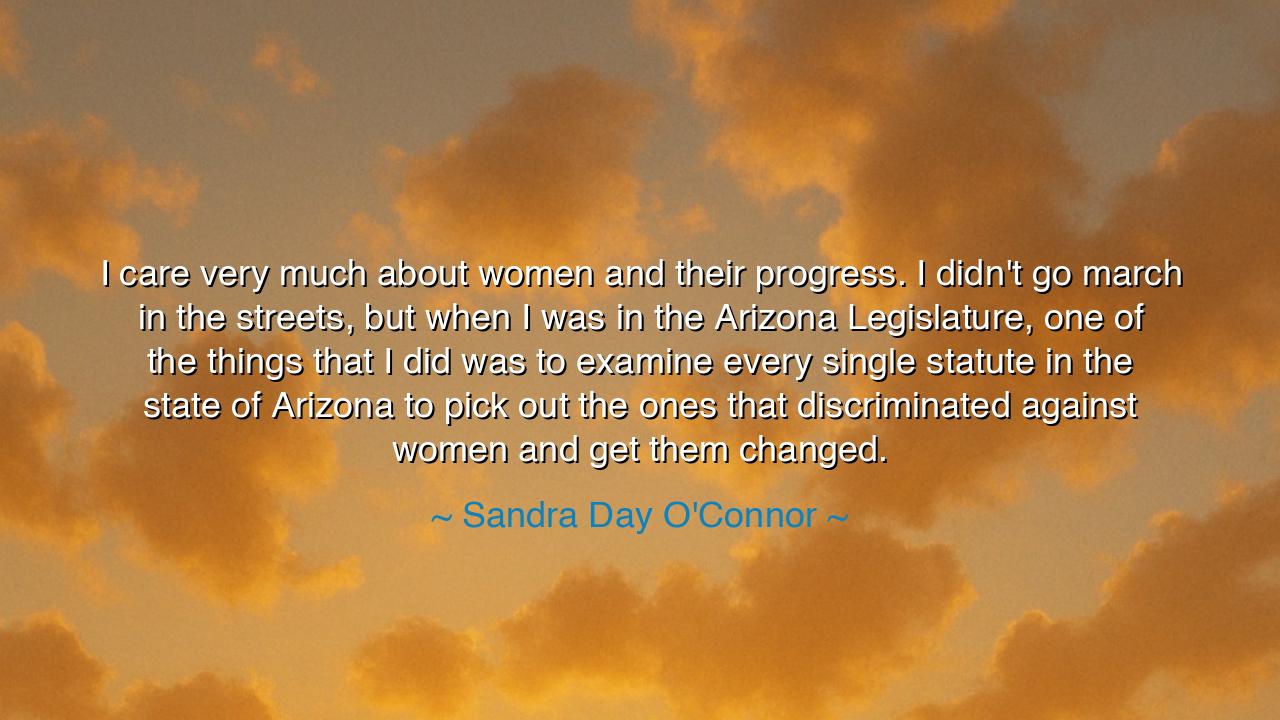
I care very much about women and their progress. I didn't go
I care very much about women and their progress. I didn't go march in the streets, but when I was in the Arizona Legislature, one of the things that I did was to examine every single statute in the state of Arizona to pick out the ones that discriminated against women and get them changed.






When Sandra Day O’Connor declared, “I care very much about women and their progress. I didn’t go march in the streets, but when I was in the Arizona Legislature, one of the things that I did was to examine every single statute in the state of Arizona to pick out the ones that discriminated against women and get them changed,” she spoke with the steady wisdom of one who knew that revolutions can be waged not only with banners and chants, but also with patience, precision, and law. Her words reveal that the struggle for women’s progress is fought on many fronts—some in the fire of protest, others in the quiet but enduring labor of reform.
The ancients would have recognized this balance of methods. In Rome, tribunes of the plebs did not march in mobs alone; they studied laws, called assemblies, and struck down statutes that shackled the common people. O’Connor’s work in the Arizona Legislature stands in this same tradition. Where others rallied in the streets, she sharpened her eyes upon the statutes, stripping away line by line the hidden injustices that denied women equality. Her rebellion was not noisy, but it was no less mighty.
History confirms the power of this approach. The Civil Rights Movement is often remembered for its marches and speeches, yet its victories were secured when the courts and legislatures struck down laws that enshrined segregation. Rosa Parks lit a fire in Montgomery, but it was the courts that extinguished the legal basis of Jim Crow. Likewise, O’Connor knew that for women, marching raised the cry, but altering the law ensured that progress would not wither.
Her words also remind us of the many faces of courage. Not all warriors carry placards; some wield pens, some sit in chambers, some labor in obscurity to undo the injustices written into the very bones of society. To change statutes is to uproot injustice at its root, so that future generations may grow in soil that is freer and more just. O’Connor’s legacy shows that progress is not only about passion, but also about perseverance.
Thus, let this wisdom endure for the generations: every battle for equality requires both the roar of the streets and the patient chiseling of the law. Women’s progress is built not only by those who shout against injustice, but by those who dismantle it clause by clause, ensuring it cannot rise again. Sandra Day O’Connor’s words are a testament to this truth—that lasting change is not always loud, but it is always deliberate, steady, and unyielding.






DMDuyen My
O'Connor’s work in the Arizona Legislature reflects the importance of practical, policy-driven change, but can we risk overlooking more symbolic acts of activism, such as marches and protests? While changing laws is important, are there ways to simultaneously change public perception and cultural attitudes toward women? Can one person’s legal work truly create a ripple effect in society, or does it require a larger, collective movement?
LTLe Tri
Sandra Day O’Connor’s quote demonstrates a thoughtful, methodical approach to change. By directly addressing discriminatory statutes, she shows that legislative work can be a powerful tool for women’s progress. However, should we view activism as a spectrum? If not marching in the streets is valid, what other forms of activism might go unnoticed? How can we ensure that quieter forms of advocacy also receive the attention they deserve?
TKTHU PHAM THI KIM
O'Connor's contribution to women's progress through legal reform is commendable. But does this quote reveal a deeper issue about the nature of activism? Is it enough to simply change laws, or is societal acceptance of women’s rights equally important? Could the legal changes she fought for be undermined by lingering prejudices in other areas of society? What more can be done outside the legal realm to foster real gender equality?
APNhut anh Phan
I appreciate how O'Connor’s work shows that activism doesn’t always have to be loud and public—it can happen behind the scenes. Her method of tackling systemic discrimination through the law seems effective, but how accessible is this route for most women? What about the grassroots movements that happen in communities? Can one be as effective as the other in pushing forward women’s rights, or do they complement each other?
DPDang Phuong
O'Connor’s approach is a practical and direct way to make lasting change—by identifying and altering discriminatory laws. But I wonder, does focusing on legislative reform overshadow other important aspects of gender equality, like cultural or social norms? How do we balance legal changes with the broader societal shifts needed to truly achieve equality? Can laws change fast enough to keep up with evolving gender dynamics?